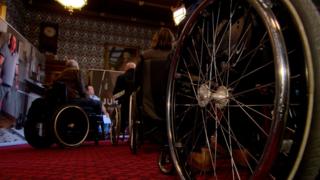
Sinn Féin has rejected a government accusation that it is holding up the implementation of pension payments for people injured during the Troubles.
The scheme was due to open on 29 May.
NI Secretary Brandon Lewis said it was "pretty shameful" of Sinn Féin to try to re-open the definition of a victim and described the current situation as "dreadful".
Sinn Féin has argued the criteria for the scheme is flawed and discriminates against former prisoners.
The party has refused to nominate a Stormont department to run the scheme and said the government is responsible for the delay.
It said that, under current eligibility rules, anyone who has served a prison sentence of two and a half years or more would not be entitled to a Troubles pension payment.
"It is the British government who have brought in these regulations, without consultation, to be discriminatory, and all they are interested in is to protect one section of victims," said Sinn Féin's Gerry Kelly.
Analysis
By Julian O'Neill, BBC News NI home affairs correspondent
So money is only part of the problem.
The troubles pension delay is as much to do with who qualifies as it is about who pays.
Sinn Féin was already angry the scheme will not use the 2006 definition of a victim, thereby excluding those injured by their own hand.
However, it is claiming it has become wider than that.
According to several sources, the Northern Ireland Office has produced draft guidelines, shared with parties, on the scheme's operation.
Sinn Féin says, in its view, anyone with a conviction of more than two-and-a-half years will be ineligible.
Whether this would be legally enforceable is another issue.
But it is a significant barrier to Sinn Féin permitting the Executive Office to designate a department to run the scheme.
As a party source puts it: "There is no point nominating a department if there isn't a level playing field."
And without a designated department, the scheme and payments are held-up, no matter the argument over who funds it.
Speaking on the BBC's Good Morning Ulster programme, Mr Kelly said his party also had concerns about funding arrangements for the scheme, the cost of which has been estimated to reach at least £100m over the first three years.
Sinn Féin has argued that it should be funded centrally from Westminster rather than coming out of Stormont's budget.
The secretary of state has refused to commit to providing extra resources to fund the scheme, pointing out that more than £100m has already been set aside for legacy matters.
Brandon Lewis added that victims should not have to go through a potential costly and painful court process to receive payments to which they are entitled.
What is the Troubles pension?
The pension is a government payment scheme which will provide financial support to thousands of people who were seriously injured during more than 30 years of violence in Northern Ireland, known as the Troubles.
The Troubles claimed more than 3,500 lives but another 40,000 people are estimated to have been injured and campaigners led a long-running campaign for financial redress from the state.
The current pension scheme drawn up in 2019 by the UK government, when the Stormont assembly was not functioning.
Its aim is provide pension-like payments to victims of the Troubles, every year for the rest of their lives, with payments ranging from £2,000 to £10,000.
Key points of the scheme include:
- Victims are eligible to apply if they were injured in an incident at any point between 1 January 1966 and 12 April 2010, the date that responsibility for policing and justice was devolved to Stormont
- It will be open to those injured anywhere in the UK - no matter where they are from - and to those who normally reside in the UK but were injured anywhere in the world as a result of the Troubles
- The pensions will be backdated to 2014 - the date when they were first agreed, in principle, by the Stormont parties under the Fresh Start Agreement
- There will also be provisions to extend payments to those who care for Troubles' victims for more than 35 hours a week
- In the event of a Troubles victim's death, there will be provisions to make a payment to their loved ones
A judge-led board will decide who qualifies for the scheme, with the government insisting it would only apply to people who were injured "through no fault of their own".
That was criticised by campaigners who argued it is an attempt to circumvent the definition of a victim contained in the 2006 Victims and Survivors Order.
That definition identified a victim or survivor as someone who has been "physically or psychologically injured as a result of or in consequence of a conflict-related incident" but it made no reference to an individual's culpability.
The board will have the power to exclude applicants with unspent convictions.